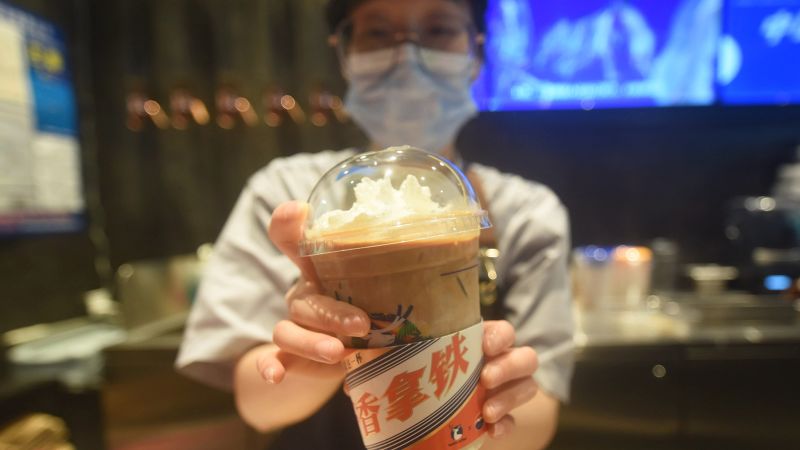Luckin Coffee has joined forces with Kweichow Moutai, the maker of China’s fiery national liquor baijiu, for an unusual offering: alcoholic lattes.
The popular Chinese coffee chain rolled out the so-called “sauce-flavored latte” with a jolt of liquor for 38 yuan ($5.20) on Monday. Customers who order with an online coupon will be able to receive 50% off for a limited time, it said.
The “sauce” in the name is an apparent reference to the slightly savory notes of Moutai’s liquor that has been compared by some drinkers to soy sauce.
The new drink quickly became a hot topic on Chinese social media, with many users wondering if it was safe to consume on the go. The question “Can we drive a car after drinking that Moutai coffee?” was the number one subject on social network Weibo on Monday, with 430 million views.
Moutai’s baijiu is a throat-tingling spirit that typically contains 53% alcohol.
The clear, potent spirit has been dubbed “firewater,” thanks to its strong taste. The red-and-white bottles of Moutai’s flagship product, “Feitian,” or “Flying Fairy,” are a staple at Chinese state banquets and business events.
For its new tie-up with Luckin, each cup has just a tiny fraction of liquor, with an overall alcohol content of about 0.5%, according to Luckin.
The company suggests, though, that drivers, teenagers and pregnant women should refrain from drinking the latte.
The new drink, offered to customers with a spurt of whipped cream on top, is the latest effort by Moutai to diversify its offerings.
Last year, the brand showcased another surprising use of its liquor by opening a Moutai ice cream store, selling spiked desserts to consumers in the city of Zunyi in southwest China’s Guizhou province.
The format proved a big hit, with nearly 10 million cups sold as of a year later, the company said in a statement this May.
Luckin Coffee has made a comeback with consumers after becoming mired in a fraud scandal that caused its ejection from Wall Street three years ago.
The coffee chain is once again a leading brand in China, and currently says it operates as many as 10,000 stores across more than 240 Chinese cities.
— Nectar Gan contributed to this report.
Read the full article here










